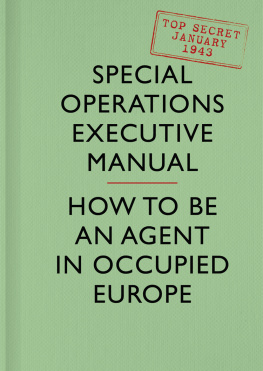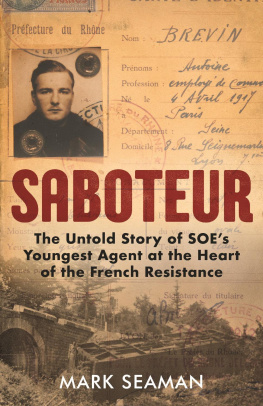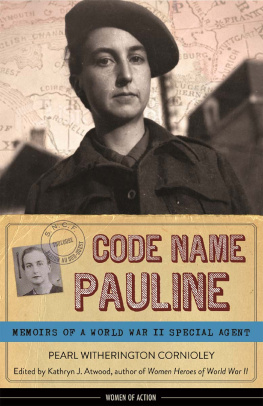(To be given by House Commandants to all students on arrival).
INTRODUCTION.
This is the most important part of your training. You will, therefore, in your own interest be subject to strict security rules.
GENERAL SECURITY PRECAUTIONS.
a. You will not be allowed to leave these grounds during the course unless accompanied or specially instructed to do so.
(N.B:- i. This does not apply to British Officers undergoing non-operational training.
ii. House Commandants may use their discretion about recreational walks; if in doubt they should refer to the Security Officer.)
b. You must never disclose at any time to anyone that you have been at this School or at Beaulieu.
c. You must never recognise anyone whom you have met here if you happen to meet them later on elsewhere, except on official business.
LOCAL SECURITY RULES.
a. You will hand to me all identity documents now in your possession for inspection. (Paybooks will be retained by me during the course.)
b. You will hand to me any firearms, other weapons, cameras or notebooks in your possession for retention during the course.
c. You will hand to me any money in excess of 5 and any valuables for safekeeping until your departure. If you wish to retain more than this sum you must obtain permission through me from the Area Commandant. Failure to comply with this rule will be regarded as contributory negligence in the event of any loss. Any loss of kit or personal property must be reported to me immediately.
d. Mail.
i. Outgoing. All letters will be handed to me in a stamped, unsealed envelope for censoring. You must not make any reference in your letters to the fact that they are censored.
You will use the Postal Box address already given to you or the special arrangements for writing overseas.
Your letters will be posted in London.
ii. Incoming. All letters sent to you will be censored by the Administrative Officer.
e. Telegrams. Telegrams, which may only be sent in cases of urgency, will be handed to me for censorship and despatch.
f. Telephone. You will not use the telephone here or in the locality. (This rule is only relaxed in special cases where H.Q. desires to communicate urgently with a student.)
First of all let me bid you welcome. I hope that you will enjoy your Course here and will find it helpful to you.
Now lets get to work. The purpose of the Organisation to which you and I belong is Subversion. Subversion, properly applied, is one of the most potent weapons one can use. It is the fourth arm in modern warfare. What are its objects? They are fourfold. I will give you these four headings, and I should like you to pay particular attention to them as they are going to govern most of what I am going to say to you this morning.
In the first place the objective is to damage the enemys material to the maximum extent, and also all his means of communication and production. Modern warfare is almost entirely dependent on material and communications. With every successive war there is an increasing emphasis on machines and equipment, so much so that no country without considerable industry at its call can now dream of making war on a large scale. Therefore if you destroy as many machines as possible, and damage the means of production, you have gone a long way in hampering the enemys effort.
The second objective is to strain the enemys resources of man-power. Towards the end of any long war the question of man-power grows every day more vital. The Germans at this moment are combing all their industries for men to put into the field, and trying to replace them by foreign labour. Every General seeks to employ the maximum amount of his resources at the vital point of attack or danger. If a sufficient force can be diverted to provide sentries, police, etc. the enemys main force is thereby weakened.
The third objective is to undermine the morale of the enemy. In any long war the question of morale becomes an increasing anxiety to leaders on both sides. If the morale of one side cracks they lose the war, however many troops they may have left. In the Autumn of 1918 the German troops were no longer fighting in the same way as they had been previously. Why was that? Partly because they were getting hungrier every day, partly because they were getting tired of being kicked round by their N.C.O.s you can stand that on a full stomach but it is not so easy on an empty one partly because they were getting misery letters from their people at home. The morale of the German army was cracking and, in consequence, the German army cracked. Anything we can do to help along this process during the present war is going to help to shorten it. There are plenty of methods. We must not forget also the question of the Quislings, the collaborators. We want them also to feel thoroughly uncomfortable.
Finally, there is the converse of this, to raise the morale of the populations of the Occupied countries in order that they may give us vital assistance when the right moment comes.
How do we achieve all this? There are plenty of methods to produce all the effects we seek to bring about.
Damage to the enemys material and means of production is, of course, achieved by sabotage. Now there are various kinds, or degrees, of sabotage and we can put these in an ascending scale. There are at least four stages.
First of all there is the form of sabotage known as Passive Resistance an innumerable series of small acts which entail virtually no risk to the perpetrators. The main principle is non-co-operation making the enemy feel that, while you are keeping within the letter of his law, you are not in the least won over by him and are only waiting your chance to liberate yourselves. The enemys life in Occupied countries should be made as thoroughly uncomfortable as possible. He should be made to feel an alien in a hostile environment. The Boche is an emotional creature who cannot stand too much dislike.
All sorts of extra work can be created for him by over-caution and especially by excessive zeal. The sort of zeal that sends him anonymous denunciations of his collaborators, that sends him in reports of non-existent unexploded bombs, elusive parachutists, etc. etc. If the thing is properly worked he need never suspect that he is being made a fool of.
The second stage we may call industrial sabotage. Here there is some risk to the perpetrators, but it is not excessive. In the first place anything which can be done to prevent workers going to German factories is all to the good. As we have said, the Boche is anxious to recruit all the foreign labour he can in order to release his own men for the Army. Let us try to stop that. But one may as well take advantage of the fact that the workers will undoubtedly continue to flock to Germany, whether as volunteers or as conscripts, by including amongst them agents recruited specially for the purpose of starting sabotage in German factories. Here the possibilities are immense. The Germans claim to have already millions of foreign workers in Germany and only a very small percentage of these workers can really wish Germany to win the war.
In the third place, a great deal of damage can be done to factories and workshops by omitting to carry out certain essential functions, such as lubricating, or by substituting some abrasive for the real lubricant.
Lastly, workers can also hold up German production by a measurable percentage by causing waste and delay, and by excess of zeal or by over-caution. One can insist on a pedantic adherence to regulations or ask for frequent renewals and overhauls of machinery so as to produce the best results. Too much time can be spent on doing any one job. One can always appear to insist upon an unnecessarily high standard. If every worker in every German factory were to leave his bench for the purposes of nature for double the usual period the effect on production would be quite measurable. One can also waste precious lubricants by over-lubrication, and time by too much attention to the safety regulations.










